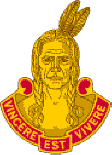101st Field Artillery Regiment, Massachusetts Army National Guard: Difference between revisions
Knorrepoes (talk | contribs) m (Text replacement - "↵↵↵Literature" to " Literature") Tags: Mobile edit Mobile web edit |
Knorrepoes (talk | contribs) m (Text replacement - "Category: " to "Category:") Tags: Mobile edit Mobile web edit |
||
| Line 32: | Line 32: | ||
[[Category:Military heraldry of the United States]] | [[Category:Military heraldry of the United States]] | ||
[[Category:Army heraldry]] | [[Category:Army heraldry]] | ||
[[Category: Granted 1931]] | [[Category:Granted 1931]] | ||
Revision as of 08:39, 15 October 2023
101ST FIELD ARTILLERY REGIMENT, MASSACHUSETTS ARMY NATIONAL GUARD
| (Coat of Arms) |
(Distinctive Unit Insignia) |
Official blazon
Shield: Gules, a fleur-de-lis crowned Or, in sinister chief an anchor and cannon saltirewise Argent (badge of the 9th Corps, Civil War); on a canton of the last a tomahawk and a powder horn crosswise Azure stringed and veruled of the second.
Crest: That for the regiments and separate battalions of the Massachusetts Army National Guard: From a wreath, Or and Gules, a dexter arm embowed, clothed Blue and ruffed White Proper the hand grasping a broad sword Argent the pommel and hilt Or.
Motto: VINCERE EST VIVERE (To Conquer is to Live)
Distinctive Unit Insignia. Description: A gold color metal and enamel device 1 1/4 inches (3.18 cm) in height overall, consisting of the gold bust of a Native American affronté attired with two feathers. Attached below a red scroll inscribed "VINCERE EST VIVERE" in gold letters.
Origin/meaning
The shield is red for Artillery. The tomahawk and powder horn allude to the earliest history of the regiment. The canton is white, the old Infantry color. The anchor and cannon device is a portion of the Corps badge of the 2d Division of the 9th Corps, in which Battery "A" - then the 11th Battery, Massachusetts Light Artillery, United States Volunteers - served during the Civil War. The crowned fleur-de-lis is taken from the coat of Arms of Verdun and represents the World War I service of the organization.
Distinctive Unit Insignia: The bust of the Native American is adapted from the seal of Massachusetts as cut in 1628.
The coat of arms was originally approved for the 101st Field Artillery on 17 Jun 1931; redesignated for the 212th Field Artillery Battalion on 10 Aug 1942; redesignated for the 212th Armored Field Artillery Battalion on 17 Nov 1942; redesignated for the 212th Field Artillery Battalion on 11 Feb 1954; redesignated for the 211th Artillery on 12 Jun 1961; redesignated for the 211th Field Artillery on 24 Jul 1972 and redesignated on 18 Oct 1993, for the 101st Field Artillery, with blazon revised.
The distinctive unit insignia was originally approved for the 101st Field Artillery on 18 Jun 1931; redesignated for the 212th Field Artillery Battalion on 10 Aug 1942; redesignated for the 212th Armored Field Artillery Battalion on 24 Nov 1942; redesignated for the 212th Field Artillery Battalion on 11 Feb 1954; redesignated for the 211th Artillery on 12 Jun 1961; redesignated for the 211th Field Artillery on 24 Jul 1972 and redesignated on 18 Oct 1993, for the 101st Field Artillery, with description revised.
Literature: Images from Wikimedia Commons. Information from The Institute of Heraldry, US Army.

